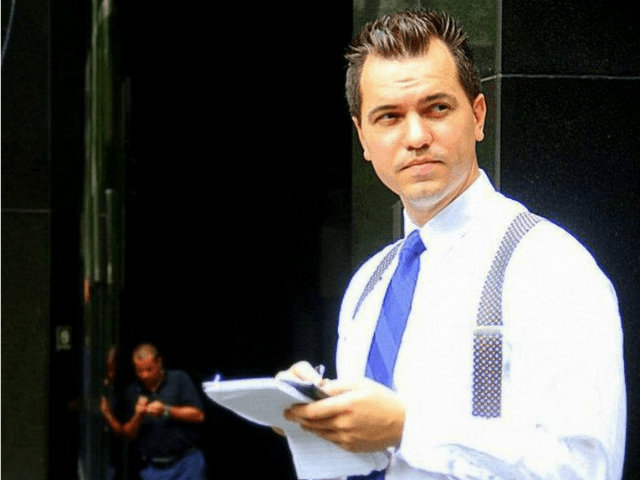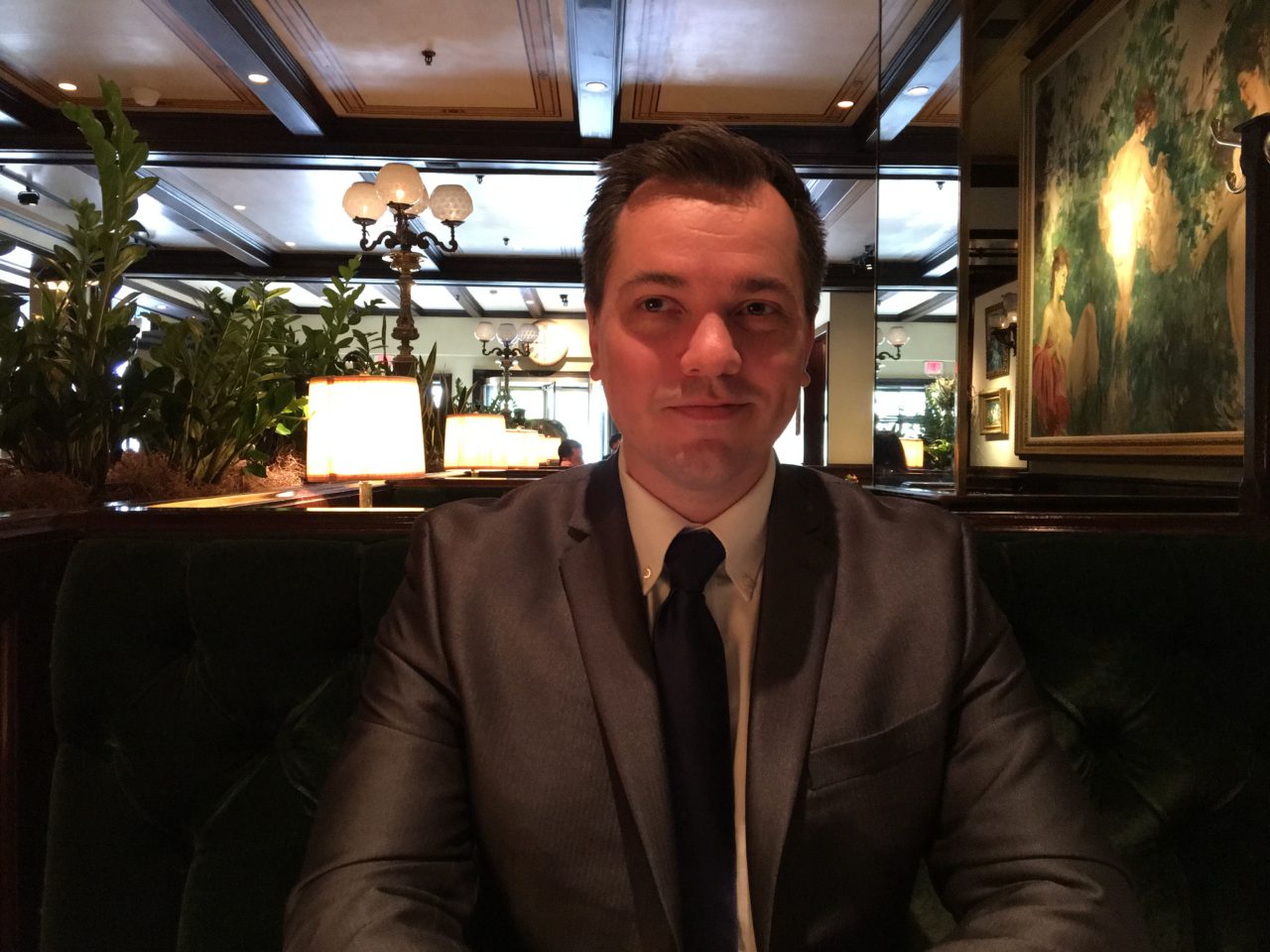Austin Petersen once collected me in his Ford pickup, wearing a t-shirt, khaki shorts, and a baseball cap. We stopped off at a convenience store in the Old Town in Alexandria, Virginia, where he bought a packet of Turkish Gold blend Camels, and proceeded to tell me why I needed to advocate for gun ownership in my home country, England.
I was in a blue suit, with a blue shirt, a red tie, and a white pocket square. I can’t forget it, because the British press won’t let me. That day Petersen and I took a picture that would be used to label me a “right-wing extremist” in Britain: awkwardly holding a pistol (with its shipping material still around it).
How the tables have turned.
When I met Petersen in downtown Washington, D.C. this week, he was the politico, and I was the sloppy journalist. His ruddy grey suit, crisp white shirt, and blue tie all said: “That me [in cargo shorts] was me when I wasn’t [running for office].”

Austin Petersen holds a toy gun during a rally on the grounds of the Washington Monument July 3, 2013 in Washington, DC. Gun rights advocates participates in the Armed Toy Gun March on D.C. to raise money and toys for the Toys for Tots program. (Photo by Mark Wilson/Getty Images)
In fact that is what he literally said as I quizzed him on his sharp new look at the famous Old Ebbitt Grill just a few minutes walk from the same White House that Petersen wants to occupy in 2017.
But since he’s running to be the candidate of the Libertarian Party, that probably won’t happen. He may though, preside over a record result for the free market, small government party – if optimistic commentators are to be believed. Libertarian Party membership is surging following Donald Trump’s (probable) win of the Republican candidacy, he tells me.
But the party took just 0.99 per cent of the vote in 2012, 0.4 per cent in 2008, 0.32 per cent in 2004, and 0.36 per cent in 2000. Surely the only way is up?
And Petersen’s combination of social liberalism and fiscal conservatism could help propel him – if he gets the party’s nod – to a more respectable position in the general election in November.
In his own words, Petersen’s politics can be best summed up by the phrase: “I believe in a world where gay married couples can defend their marijuana fields with fully automatic machine guns”. His campaign slogan: “Taking over the government to leave everyone alone”.
Cue some confused applause from within conservative and liberal circles alike.
But his real challenge is gazumping the “favourite” candidate – Gov. Gary Johnson – who critics refer to as tired and past his prime, and supporters back as the only credible/established candidate. The other option for libertarians this cycle is cyber security mogul and all round eccentric John Mcafee.
Petersen, however, has mostly good things to say about both men, describing Mcafee as “very appealing” with a “melodious voice”. He calls him an “attractive man” with “gravitas”, though he does believe that Mcafee is a policy lightweight apart from on the issue of cybersecurity. He adds that some of the things the web guru blurts out can be “off putting”.
Petersen’s quest for presentational excellence was never better displayed than at the Libertarian Party debate. A poll on LP.org had him winning the debate by 31 per cent to Gary Johnson’s 28 per cent. Mr. Mcafee was behind on 18 per cent.
What caused the victory?
“Mr Johnson has trouble articulating his ideas,” says Petersen, again, cushioning his criticism by calling his competitor an “attractive man” with “athleticism” (the 63-year-old former Republican governor is a triathlete). But, Petersen says, he’s “not quite on par with someone who wants to be commander in chief”.
“Are you?” I wondered, knowing the reputation Petersen has online for being somewhat of a “troll” – perhaps an unfair description of a man who simply seeks to challenge the status quo at every opportunity. He describes it better, or more traditionally, as “American contrarianism”.
So how does a 35-year-old from Independence, Missouri who was raised on a horse farm on the edge of a town called Liberty (I’m not making any of this up), convince conservative America to support him? Especially with his socially liberal attitudes.
“This is 2016, and conservatives are so desperate they are considering a libertarian for the first time ever”.
Maybe describing oneself as the candidate for the desperate isn’t the greatest start, but he does point to how the recent U.S. Supreme Court ruling on gay marriage turned a lot of social conservatives into libertarians. Not by supporting the ruling, but in shifting their argument from banning same sex marriage to one that involves getting government out of the business of marriage in the first instance.
“Now we’re libertarians and we want government out of marriage,” he chuckles, adding: “People accuse me of speaking in bumper stickers, but this is the year of Donald Trump. If you cannot break it down in a sentence…” I get it.
And that’s exactly what he does, perhaps a consequence of having been the editor of the Libertarian Republic website, Petersen manages to boil things down to a tweet, even in spoken word.
“You own your life, you own your body, you ought to be able to do with it as you please”, he argues. “As long as you don’t harm anyone else”. Okay, two tweets.
By this point I’m sure he’s going to win over many social conservatives. And we haven’t even reached the part where I ask him about transgender toilets. But that’s not really what he’s going for. Case in point:
“We’ve had transgender people in this country since we were founded,” he hyperbolises. “Who was a transgender founding father?” I enquired, hoping to break the biggest news story of my life.
“Ben Franklin, perhaps, right? Haha. Many of them had some freaky practices”. Way to lose the crowd on both sides. Now transgendered people can use any bathrooms they want, but they’re also freaks. It’s fine – he was only kidding. But the way American politics is right now, each side of the fence appears to be a mine field, and the fence itself has poison-tipped metal spikes. There’s no winning either way and Petersen knows it, so he goes with his gut instinct.
“[Being kind to] people struggling with their sexuality… that’s what America is all about.. you can be whatever you want to be in this country. Yes I believe you have a biological sex, that’s just science. But this [debate] reeks of a media conspiracy, it drives traffic to websites.”
Quite right, not least his own, which has its own section for transgender-related news, with headlines like, “Transgender Athletes In Women’s Sports Spits In the Face of Feminism” and “New York Can Fine You $250k For ‘Misgendering’ Somebody”.
His solution to this concern is similar to his solutions to most others. It’s the archetypal libertarian response: “The government needs to stay out of it – private establishments can make the decisions on their own”.
No problems there, “But what about public toilets?” I ask.
“Public toilets are already gender neutral for the most part. If its public… perhaps offer… a family room for instance. Fifty years ago these people existed and were using the bathrooms at their will. We should be compassionate to people because many of these people are suffering”.
Flatly, it seems, Petersen won’t be dragged the route of “alt right” populism. His first instinct is liberty, which is why he notes: “Donald Trump is politically incorrect, but his politics are incorrect. I am politically incorrect, but my politics are correct”. I would have worried if he disagreed with himself. There’s contrarianism and there’s contrarianism.
But I’ve also yet to hear anything politically incorrect from him yet. Granted, my bar is high, and he’s certainly not an establishment-style robot. But he’s hardly railing against the cultural status quo. More, he seems like a return to Ron Paul-esque, laser-like focus on policy responses to the problems facing America. The main policies being: Scrap it. Cut it. Get government out of it. Not too shabby.
Petersen talks of the “$1.5 trillion boondoggle” of the F-35 fighter programme, his plan to audit the Pentagon, introduce a flat income tax “of around 10-15 per cent” and of his “one percent across the board” cut to all government departments.
“That includes the military”, he boasts, adding: “I won’t endanger the national security of the American people”.
It’s a sort-of-Trump, sort-of-Sanders, sort-of-Ron Paul situation he finds himself in on foreign affairs.
“I would advocate that we start to draw down our military obligations around the world,” he begins, criticising the U.S. government for keep the country on a “Cold War footing”.
“I do believe that we need to not be the policemen of the world. I do believe that we need to pull our troops out from many of these countries”. Specifically, he lists Germany and Japan as places where U.S. troops no longer need to be stationed.
“Are you a letters of marque kind of guy?” I ask.
Without missing a beat, in perhaps the most confident tone of our time together, Petersen shoots back: “You’re damn right”. I thought he was going to hug me just for asking the question.
During America’s founding, he says, there were only a few U.S. government ships, but around one thousand privateers to protect U.S. interests against the British. I grumble something rude.
In his world, instead of expensive, government-run military incursions, all you’d do is take people already trained by U.S. tax payer – former SEALs, former DELTA, “veterans itching to do us a favour” – and deploy them on the basis that they can sell any captured weaponry, loot, or claim bounties from the U.S. government for certain operations.
Sounds crazy, right? But not until you speak to military officials or private military types do you realise this is a strategy that the U.S. is moving closer and closer towards anyway. In recent U.S. wars, companies like Blackwater (now Academi) and KBR have been doing work for the U.S. government. Using letters of marque only creates a more transparent and ostensibly constitutional way of doing this.
And we’re back to the sort-of-Trump, sort-of-Sanders discussion – which is probably unfair to Petersen as his demeanour is nothing like the two. He sits with with almost impeccable posture, intently listening while I blabber on about the Scottish National Party. I realise I’m supposed to be asking him questions, so I hit him with “Are you more like Bernie Sanders than Donald Trump?”
“Absolutely not,” he shrieks, before shifting in his seat. “Actually, can I take that back?”
“I don’t know what Donald Trump really believes”. At least Bernie Sanders agrees with him on marijuana legalisation, he notes.
“The thing that bothers me is that Trump and Sanders are so similar… they both want the border wall for different reasons. I represent something radically different – more laissez faire”.
“Goody, immigration,” I think. So what of it?
“Every single economics study I’ve read,” he starts, “states that legal or not, immigration is a net benefit to people of the United States. While you have wage suppression, you also have price suppression. No one wants to pay $10 for a cheeseburger.”
“Were cheeseburgers $10 before we had mass immigration?” I enquire. (The price of a cheeseburger in the Old Ebbitt is $14.00).
“If we were to deport 11 million workers and migrant labourers, prices would necessarily rise because costs would come up”.
Not necessarily untrue. But a lot of concern over mass immigration stems from cultural clashes, not just fiscal imperatives. But he does paint a stark picture of mass deportations in a zero-amnesty America.
“In order for us to deport 11 million people you would have to create a government of totalitarian powers, which I am absolutely not willing to do”.
Again he returns to the founding fathers.
“King George tried to prohibit colonists settling the West. If King George had attempted to build a wall I’m certain the colonists would have dug under it, tunnelled under it, climbed over it, and done anything they could because life finds a way.”
“There’s a big difference between Jefferson and Los Zetas though?” I asked.
“[Los Zetas are] a direct consequence of the war on drugs. We need to end the war on drugs and you will have less violence on borders – another libertarian solution”.
Fair enough. But what about the cultural impacts?
He lists America’s Mormon, Jewish, and Amish communities as those which in some instances in different parts of the country, self-segregate, become insular, and do not necessarily integrate into their surrounding communities. Again, this is a liberty issue for Petersen. The freedom to be segregated.
“It doesn’t bother me that people would come here to seek that kind of freedom,” he says.
I tell him how uneasy I am about that, having seen the segregation of the Muslim communities in East London – my home town.
“I really don’t worry about cultural cohesion because here in the United States we have such strong nationalism. Here you can’t turn your head left or right without seeing an American flag [and] in the United States we have a constitution that supersedes any attempt to impose an order not founded in natural law or civil liberties.
So nationalism is a good thing? Finally, some right wing red meat. “[But it] is a double edged sword”, he adds, before telling me that while he supports a UK exit from the European Union and “very much likes Nigel Farage” – he shies away from the UK Independence Party’s nationalistic side.
“But if I can’t fly a U.S. flag on an American university campus without being called a fascist, isn’t that a problem?” I ask.
“Student radicalism has always existed,” Petersen says as we pivot onto the issue of safe-spaces and radical leftism across the country.
“It is magnified now due to social media,” he remarks, “[and] we have a higher population, so we’re all at tighter quarters”.
Also, he notes of student radicalism: “It is right in line with American contrarianism. America is a rebel nation”. He points to the environment on campuses in the 1960s and 1970s, noting that Thomas Jefferson said: “God forbid we should ever be twenty years without a rebellion”.
“We have a cultural revolution every 10 years now” he says – not casting a judgment either way on whether these were good or bad “revolutions” we are seeing, but certainly alluding to a more long-term mindset than one that works within political cycles.
“If Trump were to take power and become President of the United States,” he concludes: “there would immediately be a counter revolution… It doesn’t surprise me to see these things, it doesn’t trouble me… free speech will always win out”.
I feel by the end of this interview that maybe – though certain commentators would like you to believe it is the ‘Never Trump’ crowd that could make their voices heard by voting Libertarian – more support could come to someone like Petersen, if he is the nominee, from the ‘Never Hillary’ side of the Democrat Party and liberal movement.
He appears to have all the patriotism of your average Trump voter (and with every gun-toting instinct), combined with a verve for the maximisation of individual social and cultural liberty.
While Republicans like Mary Matalin have defected from the GOP over Trump, she could do more harm to Hillary Clinton than she thinks by joining the Libertarian Party, even if that’s not the point.
As for other endorsements, Petersen is coy, but even the names Mitt Romney and Jeb Bush even – though not necessarily in as gleeful a way as libertarian leaning celebrities.
“Please clap? No… Actually yes, I do want his endorsement. I want everyone’s endorsement. I don’t care who they supported before. I don’t care it if was Satan himself”, Petersen jests, adding: “The principled populists [are part of my movement]. The unprincipled populists are all behind Donald Trump”.
And with that, we got the cheque, and trundled off down the street to talk about his cargo shorts, and how I needed to advocate for gun ownership in Britain. I’m pretty sure the next time I’m in the U.S. I won’t have the pleasure of visiting President Petersen at his new home on Pennsylvania Avenue. But something tells me that his charisma and drive is exactly what the Libertarian Party needs to grow beyond its most recent performances.


COMMENTS
Please let us know if you're having issues with commenting.